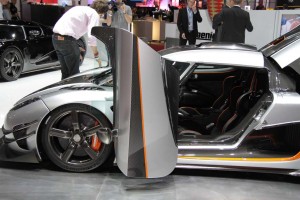It’s been a record year for automotive safety problems, manufacturers so far recalling more than 40 million vehicles in the U.S. alone, often in seven-figure increments. But the little Swedish automaker Koenigsegg has set something of its own record.
The supercar manufacturer has advised the National Highway Traffic Safety Administration it plans to recall just one single vehicle due to a tire problem.
The good news is that Koenigsegg doesn’t expect to have too much trouble finding the affected owners – make that owner — of the affected Agera, which can cost $1.3 million. The company says they’ve already notified him.
Manufacturers often struggle to find owners and make sure they come in for repairs. Typically, only about 70% have the work done, according to the National Highway Traffic Safety Administration. But Koenigsegg is expecting a 100% response rate on this recall.
(Toyota taking advanced crash-avoidance tech to the mainstream. Click Here for the story.)
The problem involves the tire pressure monitoring system on the Agera which, the maker says, may not properly illuminate. That would make it difficult to know if one of the vehicle’s tires was low. Even on a mundane car like a Toyota Prius or Ford Fusion, improper tire inflation can lead to a crash. It’s an especially serious problem on a vehicle rated to reach speeds in excess of 200 mph.
The 2013 Agera is one of the world’s most powerful vehicles – and among the rarest, annual production being measured in handfuls. The maker has actually introduced a more powerful version since the recalled model was produced in December 2012, the Agera One:1 now making a full 1,322 horsepower.
Koenigsegg problem stands in sharp contrast to the massive recalls many other manufacturers have ordered this year, General Motors, for example, covering 2.6 million models for a service action involving a defective ignition switch. But GM also announced what had been until now one of the smallest recalls ever, covering just 10 of its plug-in hybrid vehicles.
(Cadillac to offer near fully autonomous vehicle in 2017. Click Here for the story.)


Low tire pressure on a commuter car should not lead to a crash unless the operator is incompetent and unqualified to operate the vehicle. A 200 mph car suddenly loosing tire pressure is obviously a different deal.
I’m a collision teck . Hope.I get a chance to work on one in the time Have left before I retire
Wouldn’t you prefer to just own and drive one?
are you aware that a 20% drop or increase in standard tire pressure will greatly increase the risk of a blow out no matter of the speed driven. I am supporting my comment which can be backed up by any tire manufacturer (someone who actually makes tires)I know i worked for a company who makes tires. Please post with support for your comment or you just look ignorant.